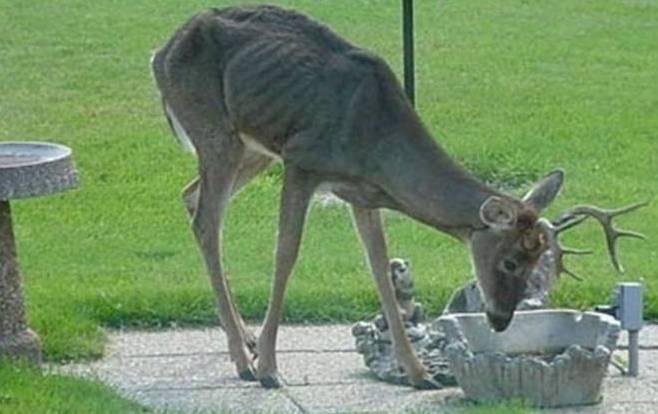 Chronic Wasting Disease, or CWD as it’s more commonly called, has most recently been detected in Mississippi. This is the closest the fatal deer disease has been to our Florida border.
Chronic Wasting Disease, or CWD as it’s more commonly called, has most recently been detected in Mississippi. This is the closest the fatal deer disease has been to our Florida border.
“We’re fortunate that CWD has not been found in Florida or our immediate neighboring states. But it’s going to take the help of hunters to keep it that way,” said Cory Morea, Florida Fish and Wildlife Conservation Commission’s (FWC) Deer Management Program coordinator. “Anyone planning to hunt deer, moose or elk out of state needs to be aware of certain laws and regulations aimed at preventing CWD from coming into our state.”
What is CWD?
CWD is a transmissible disease that affects the brains of infected cervids, such as mule deer, white-tailed deer, moose and elk, eventually causing them to become emaciated and display unusual behavior and die. It is caused by an abnormal protein called a prion.
“While there’s no evidence that CWD can be transmitted to humans or livestock, the impacts of this disease can have a significant negative impact on deer populations and our traditional hunting activities,” Morea said.
Transmission of CWD among cervids occurs by direct contact with an infected deer or by consuming prions that have been deposited into the environment. Once in the environment, the prion stays in the soil and can remain infectious for years.
To date, CWD has been found in mule deer, white-tailed deer, moose and elk in these 25 states: Arkansas, Colorado, Illinois, Iowa, Kansas, Maryland, Michigan, Minnesota, Mississippi, Missouri, Montana, Nebraska, New Mexico, New York, North Dakota, Ohio, Oklahoma, Pennsylvania, South Dakota, Texas, Utah, Virginia, West Virginia, Wisconsin and Wyoming. It also has been detected in Canada (Saskatchewan and Alberta), Norway, Finland and in South Korea.
What is legal to bring back when hunting out of state
Hunters can help by not bringing CWD back with them when they hunt out of state, and the FWC has adopted rules regulating the transportation of harvested deer into Florida.
Hunters are prohibited from bringing into Florida whole carcasses of any cervid from any of the above listed CWD-positive states or countries. From these areas, hunters can only bring back deboned meat, finished taxidermy mounts, cleaned skulls, antlers and hides – as long as all soft tissue (meat) has been removed.
The importation of live deer into Florida is also prohibited. The public is encouraged to report any possible violations to the FWC by calling the Wildlife Alert Hotline, toll-free, 888-404-FWCC (3922).
How you can help
Another way hunters can help is by reporting deer that are sick or found dead from unknown causes to FWC’s toll-free CWD Hotline at 866-CWD-WATCH (293-9282). Warning signs that hunters can look out for while in the field include deer that are extremely thin or appear sick, or those exhibiting odd behavior such as staggering, walking in circles, standing with a wide stance or head tremors. Do not handle the deer, but simply call the CWD Hotline, and the FWC will collect the whole carcass and conduct an examination.
Finally, hunters can help by providing samples from their harvested deer. The FWC would like to test more samples from the counties of Baker, Bradford, Brevard, DeSoto, Duval, Flagler, Hardee, Hillsborough, Lee, Levy, Manatee, Miami-Dade, Okeechobee, Sarasota, Seminole, Union and Volusia. Please call the CWD Hotline to coordinate sample collection from your harvested deer. The deer’s head is needed for testing, and it may be frozen and the antlers/skull cap can be removed.
“Our goal is to collect samples throughout Florida, and we’re asking private landowners and hunting clubs to participate in this research. Since 2002, we’ve tested over 10,000 hunter-killed, road-killed and sick/diseased deer for CWD,” said Mark Cunningham, FWC state wildlife veterinarian. “If you’d like to help or see a deer in Florida that fits this description, contact our toll-free CWD Hotline for further information and to coordinate collection and pickup of deer samples.”
Early detection of CWD is key, and the best chance for eradication or controlling it is to be able to detect it and act quickly to prevent its spread.
The FWC has an action team and response plan in place should CWD be detected in Florida. FWC staff is ready to respond along with other government agencies, such as the Florida Department of Agriculture and Consumer Services, U.S. Department of Agriculture, U.S. Fish and Wildlife Service, Florida Department of Health, and the Centers for Disease Control and Prevention.
What’s the number to call?
“Floridians are our eyes in the woods. If you see a deer that looks sick, unusually thin or behaving abnormally, or if you find a dead deer from unknown causes, call our toll-free hotline that’s available seven days a week at 866-CWD-WATCH (293-9282),” Cunningham said. “And if you’re hunting out of state, know the CWD status of that state and know what you can bring back.”
To learn more about CWD, including links to several state and federal government websites containing more in-depth information on this serious disease, visit MyFWC.com/CWD.
